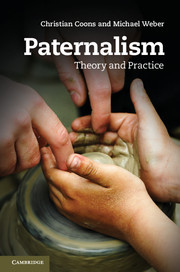Book contents
- Frontmatter
- Contents
- Contributors
- Introduction Paternalism – Issues and trends
- Chapter 1 Defining paternalism
- Chapter 2 Penal paternalism
- Chapter 3 Self-sovereignty and paternalism
- Chapter 4 The right to autonomy and the justification of hard paternalism
- Chapter 5 Moral environmentalism
- Chapter 6 Kantian paternalism and suicide intervention
- Chapter 7 Paternalism and the principle of fairness
- Chapter 8 Paternalism in economics
- Chapter 9 Choice Architecture: A mechanism for improving decisions while preserving liberty?
- Chapter 10 A psychological defense of paternalism
- Chapter 11 Libertarian paternalism, utilitarianism, and justice
- Chapter 12 Voluntary enslavement
- Chapter 13 Paternalism, (school) choice, and opportunity
- Bibliography
- Index
Chapter 1 - Defining paternalism
Published online by Cambridge University Press: 05 February 2013
- Frontmatter
- Contents
- Contributors
- Introduction Paternalism – Issues and trends
- Chapter 1 Defining paternalism
- Chapter 2 Penal paternalism
- Chapter 3 Self-sovereignty and paternalism
- Chapter 4 The right to autonomy and the justification of hard paternalism
- Chapter 5 Moral environmentalism
- Chapter 6 Kantian paternalism and suicide intervention
- Chapter 7 Paternalism and the principle of fairness
- Chapter 8 Paternalism in economics
- Chapter 9 Choice Architecture: A mechanism for improving decisions while preserving liberty?
- Chapter 10 A psychological defense of paternalism
- Chapter 11 Libertarian paternalism, utilitarianism, and justice
- Chapter 12 Voluntary enslavement
- Chapter 13 Paternalism, (school) choice, and opportunity
- Bibliography
- Index
Summary
There are three concepts all of them vague. Imagine 3 solid pieces of stone. You pick them up, fit them together and now find they make a ball. What you’ve now got tells you something about the 3 shapes. Now consider you have 3 balls of, or lumps of soft mud or putty – formless. Now you put them together and mold out of them a ball.
Wittgenstein, from Bouwsma, Wittgenstein: Conversations, 1949–1951The merit of any definition . . . depends upon the soundness of the theory that results; by itself, a definition cannot settle any fundamental question.
Rawls, A Theory of JusticeAny definition of a concept is subject to various criteria for a good definition in the context at hand. Unless we are simply stipulating how we shall be using the word – and even then questions will arise about why we picked that word to use for this stipulation – there will be some, usually implicit, ideas of what makes for a good definition. In addition to trivial ones – such as consistency – there will be a set of problems that the definition will be used to clarify or, if possible, resolve. There will be a set of constraints – weak or strong – on how the word is currently being used. There will be a context – perhaps one of personal ethics or perhaps one of current law – in which the concept finds a place. There will be some conceptual or normative issues that will be used to assess the usefulness or correctness of the definition.
There may be stipulated criteria, e.g., that the concept should not settle some particular normative matter, thereby avoiding what Hart has called the “definitional stop.” For example, if one defines terrorism as the morally illegitimate use of violence on innocent persons then the question of whether terrorism is ever morally legitimate has been settled by the definition. Sometimes, this is not an objection to a definition. If we define “murder” as the wrongful taking of human life then although we cannot raise the question of whether murder is ever right, we can raise the question of whether some killing of a human being is murder. I am going to begin by canvassing a wide variety of definitions of paternalism which may have been developed in quite different contexts for quite different purposes.
- Type
- Chapter
- Information
- PaternalismTheory and Practice, pp. 25 - 38Publisher: Cambridge University PressPrint publication year: 2013
- 27
- Cited by



